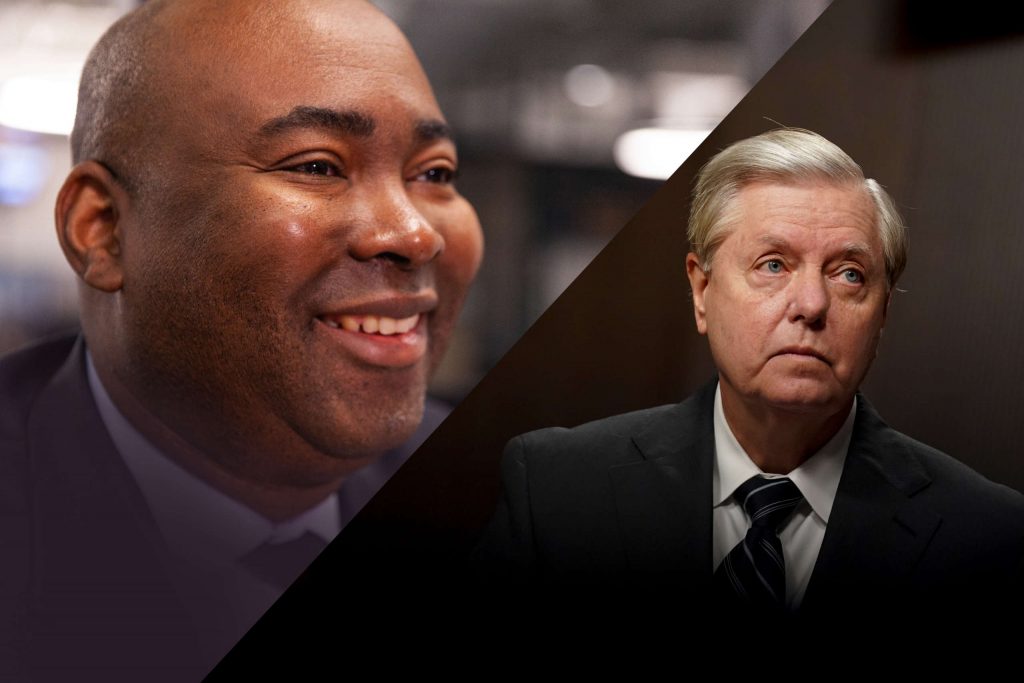By Neema Mungai, Staff Reporter

Earlier this year political analysts at the non-partisan Cook Political argued that Republicans were likely to hold control of the Senate. This was before racial justice protests broke out across the nation over police brutality and a global pandemic shattered the economy and took the lives of over 200,000 Americans.
This year’s events have fueled the Democratic Party’s election odds and brought small-dollar donations pouring into key races around the country. Analysts are shifting their assessment of Republican-held seats towards Democrats and asserting that Democrats are favored to flip the Senate.
The Collective Pac, an organization working to elect and defend Black candidates up and down the ballot, has endorsed six candidates across the nation to the U.S. Senate.
Chris Scott, the organization’s National Political Director, says voters who feel they “haven’t been getting the investment [they] need in [their] lives” will be the reason Democrats take the Senate. “Black candidates have lived experiences and are able to connect with voters across the spectrum. Folks have been able to look around and see more people like them running, and I think that’s inspiring to a lot of these candidates.”
There are 35 seats up for grabs, including 23 held by Republicans and 12 by Democrats. Cook Political has rated eight Republican-held seats either toss-ups or leaning Democratic, and by contrast, one Democratic-held seat as leaning Republican, with no Dem seats considered a toss-up.
If Democrats lose a Senate seat and the White House, they will need to flip five seats to win a majority. If Joe Biden comes out on top, Democrats can afford to win four seats as the vice president would be able to act as a tie-breaker.
Here is more on the most important races to watch on election night:
Alabama
Incumbent: Democratic Sen. Doug Jones
Senator Doug Jones won his 2017 special election against Roy Moore in a stunning upset. Even after Roy Moore lost the GOP nomination earlier this year amidst allegations of sexual assault, Jones still remains the most vulnerable senator in the upcoming election. Though he is outraising and outspending competitor Tommy Tuberville, the senator still faces an up-hill re-election battle against the former Auburn University football coach.
David Lublin, professor and chair of the Department of Government at American University’s School of Public Affairs, argues it is “hard to see” Jones come out on top “unless there’s massive Black turnout and white turnout is low.”
Arizona
Incumbent: Republican Sen. Martha McSally
Former NASA astronaut Mark Kelly is making for a strong challenger against incumbent Sen. Martha McSally. Kelly is a gun control activist and the husband of former Rep. Gabby Gifford who survived an assassination attempt in 2011. McSally was appointed to the seat after losing in her last bid and faces a well-known struggle within the GOP of aligning with the president and his supporters while also appealing to suburban voters, especially women, who dislike him. Kelly has consistently outraised McSally and is up by eight points on average in polling assembled by RealClearPolitics poll.
The Grand Canyon State has long been considered a red state, but has shifted to battleground status in 2020 and is well within reach for Democrats at the presidential level as well, with FiveThirtyEight polling averages showing Biden has consistently led the state since late March. If Kelly triumphs over McSally, both senators from Arizona will be Democrats for the first time since the 1950s.
Colorado
Incumbent: Republican Sen. Cory Gardner
Sen. Cory Gardner won his seat by targeting centrist voters and running on the promise of being “a new kind of Republican.” Since then, he has frequently supported President Trump and just recently voted to confirm his Supreme Court justice nominee. In order to win his re-election against former Governor John Hickenlooper, the first-term senator must appeal to voters in an increasingly blue state, with his strategy thus far being to tout the bipartisanship of his work on conservation legislation. According to a Wall Street Journal op-ed, Hickenlooper’s strategy has been “to tie the senator to the polarizing president.” continuously bring up Gardner’s ties to Trump, whose many controversies have polarized the purple state.
something that might not go down well in an “increasingly blue” state.
Georgia
Incumbent: Republican Sen. David Perdue
Georgia is shaping to be competitive down the ballot as the rapid diversification of Atlanta’s suburbs brings in more well-educated voters who don’t like Trump. Unseating incumbent Sen. David Perdue is within the realm of possibility for Democrats who are painting him as a political insider using the system for his own financial benefit through his stock trades. Meanwhile, Republicans have elected to frame Democratic competitor Jon Ossoff as too liberal for the state. Ossoff lost his 2017 House bid made famous as the most expensive House race in history. A recent CBS/YouGov poll has the race even, with Perdue at 47% to Ossoff’s 46% among likely voters. Both parties are preparing to see the race through to a January runoff if neither candidate can reach 50%.
Iowa
Incumbent: Republican Sen. Joni Ernst
Though Trump carried Iowa by nearly 10 points in 2016, his support has declined in the state with average state polling data showing him at a virtual tie with Biden. This has left Sen. Joni Ernst, as well as many other GOP senators, trying to convince constituents they deserve a second term, even if the president doesn’t. Democratic challenger Theresa Greenfield is attempting to relate to voters in the Hawkeye State by proclaiming she is a “farm kid,” a tactic that is working in her favor given the controversy started by Ernst when she couldn’t state the price of soybeans in a recent debate. A recent Des Moines Register poll showed Greenfield leading Ernst by three percentage points, with Cook Political dubbing this race a toss-up.
Maine
Incumbent: Republican Sen. Susan Collins
There is no denying Sen. Susan Collins is embroiled in the political fight for her life. The four-term senator faces a grueling battle for reelection as challenger and Maine House Speaker Sara Gideon works to draw attention to all the times Collins sided with the president (despite claiming she’s “very disappointed” with what the administration is doing). This inconsistency has made Collins a magnet for criticism, including from the president himself who tweeted earlier this month the senator is “not worth the work.” While Collins may gain support from moderate Republicans for voting against Amy Coney Barrett’s Supreme Court nomination, it’s unlikely it will win back the voters she drove off by supporting Justice Brett Kavanaugh in 2018.
Montana
Incumbent: Republican Sen. Steve Daines
Incumbent Sen. Steve Daines is up against Gov. Steve Bullock who, like many other governors, saw his stock rise while handling the state’s response to the pandemic. Voters in Montana are used to splitting their ticket, as Bullock’s reelection the same year Trump won the state by a 21-point margin shows. With Trump’s lead in the state dwindling to an average of six-points, Democrats view the race as particularly competitive, with the Senate Democrats’ campaign arm more than tripling their investment there. In response, a recent National Republican Senatorial Committee ad argues “Imagine Biden, Pelosi and Schumer in charge — it could happen if Steve Bullock is elected to the Senate.” A recent New York Times/Siena College poll had Daines at 49% and Bullock at 46%, within the margin of error.
North Carolina
Incumbent: Republican Sen. Thom Tillis
Sen. Thom Tillis narrowly won his first term six years ago and is now being considered the underdog in his own reelection campaign. While Democrats have made major gains in North Carolina in recent years, Republicans saw an opportunity to attack challenger and former State Senator Cal Cunningham when reports broke of an extramarital relationship. Seizing on the controversy, Republicans claim the Iraq war veteran has a “hypocritical lack of judgement and truthfulness” and “cannot be trusted at any level.”
Polling in the state indicates voters care very little about Cunningham’s personal scandal, with a Washington Post/ABC News poll showing 71% of registered voters believe Cunningham’s affair is less important, while 81% say control of the Senate is more important to them.
South Carolina
Incumbent: Republican Sen. Lindsey Graham
One of Trump’s fiercest allies and Senate Judiciary Committee Chair Lindsey Graham is facing a formidable opponent in Jaime Harrison, the Democratic contender and former state party chairman who raised a record-breaking $57 million in the third quarter. Rhyan Lake, Harrison’s press secretary and a member of Howard’s class of 2021, says the campaign has invested big on Black media outlets and notes “every penny that comes into the campaign goes straight back into investing into South Carolina.” Harrison is fairing well with white moderates and in the suburbs especially which gave House Democrats a big win in the midterms. An astounding poll from Quinnipiac University in August had the race tied at 44%, pouring more national attention and money into the race. Graham even confessed to Fox News that he’s “getting killed financially,” a fact mostly attributed to his change in attitude over the president who he loathed during the 2016 election.











